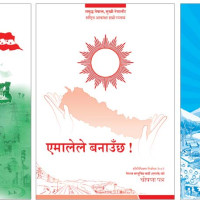- Friday, 20 February 2026
Political volatility leaves House jobless
Kathmandu, Feb. 28: Political volatility has left the Federal Parliament jobless. The government itself is unable to provide businesses to the Federal Parliament as national politics has become tricky in recent weeks with parties shifting alliances in a dramatic manner. As a result, most of the time of the winter session has ended without having business and in special hours. Ekaram Giri, Spokesperson for the Parliament Secretariat, said that the government has not brought any bill to reregister in the current session of the Parliament.
According to the provision, the bills that were inactive in the previous House of Representatives (HoR) should have been tabled in the new House for further procedures. The government registers the bills and the MPs deliberate on them. However, it could not happen this time because the government could not bring the bills in the House.
Altogether 27 bills became inactive after the term of HoR expired. Only a bill related to money laundering was registered, but other bills were not.
Data in the Parliament Secretariat showed that four bills were pending in the Lower House and nine in the National Assembly (NA). There was a bill in the House regarding the amendment to some laws related to asset laundering, while three bills – the Monitoring and Evaluation Bill-2076, Records Protection First Amendment Bill-2077, and Food Hygiene and Quality Bill-2077 – were received with messages from the NA to the HoR.
Even on Monday, the Lower House session ended after approving a condolence message on the sad demise of MP Shahnaz Rahman. Lawmaker Rahman from the Janata Samajwadi Party-Nepal died of cardiac arrest.
Not only on Monday, almost all sessions of this winter ended in zero and special hours. Moreover, on many occasion, the House sessions could not convene for lack of the presence of minimum required number of lawmakers.
Secretary Giri said House would not have been jobless if the government had wanted to make the House active. "Those 13 bills under consideration could have been there for deliberations," he added. Obviously, the House is jobless when the political parties are busy somewhere else.
Anyone can see the hectic political parleys for the election of President. They may not provide the House with jobs before March 9, the date to elect the new President.
Talking to The Rising Nepal, former Minister Balkrishna Khand said since the government could not give assurance as to how long the parliament would last, the parliamentarians could not pay attention to the bills that came to the parliament. "Though it is not a right practice, it happened when the national politics is in a fluid situation," he added. Even the committees of the Parliament have not been formed yet.
The parliament has been under the shadow of unpredictable political activities. The budget session would start at the end of April. As the political parties in the parliament are now engaged in the exercise to elect the new President, they may not be well prepared for the budget session.









